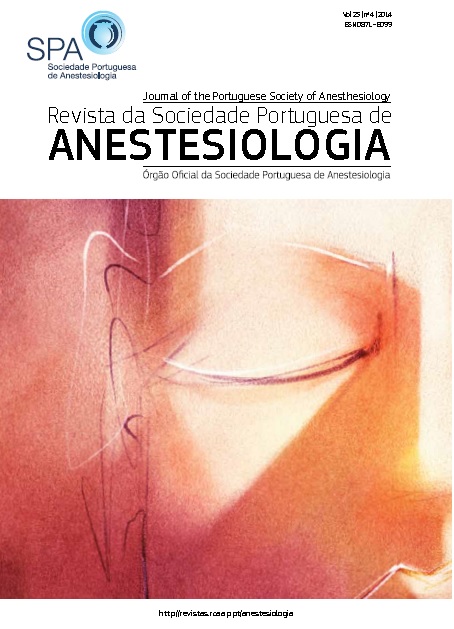Evaluation of Satisfaction with Anesthesia Care by Appliance of Heidelberg’s Questionnaire in a Portuguese Surgical Population
DOI:
https://doi.org/10.25751/rspa.6232Keywords:
Anesthesia, Questionnaires, SatisfactionAbstract
Background: Our aim is to apply the questionnaire “Heidelberg Peri-Anesthetic Questionnaire”, on patients’ receiving elective procedures in vascular, plastic and general surgery and confirm its psychometric qualities, as well as study the influence of their social-demographic and clinical characteristics on satisfaction outcome.
Materials and Methods: One hundred and ninety two patients were given a 32-item consensus version questionnaire by a member of the study who did not intervene in the patient’s anesthesiology team. This questionnaire consisted of 5 dimensions (D1- Team, D2- Fear/Anxiety, D3- Loneliness, D4- Discomfort). Questionnaire delivery occurred between July and October 2013.
Results: The results revealed that all items contribute to instrument internal consistency (Cronbach’s α 0.614-0.826). The highest satisfaction was associated with Team Dimension (D1) and the lowest satisfaction with Discomfort (D4). After a multiple linear regression analysis, gender showed influence on Discomfort (D4) and Anxiety/Fear (D2), with men showing less fear and less discomfort. Also, less literate patients were more satisfied with D1 as well as patients with pre-anesthetic consult.
Discussion: We established an important correlation between pre-anesthesia consult and D1 indicating that these patients were more satisfied probably due to communication and better doctor-patient relationship. We didn’t find any significant effect of type and duration of anesthesia, surgical service, surgical risk and ASA physical state.
Conclusions: Globally we can determine that patients were satisfied with their anesthesia care and this questionnaire could easily be used in a day-to-day basis and could give a reliable feedback on the anesthesiologists’ performance during perioperative period.
Downloads
Downloads
Published
How to Cite
Issue
Section
License
Articles are freely available to be read, downloaded and shared from the time of publication.
The RSPA reserves the right to commercialize the article as an integral part of the journal (in the preparation of reprints, for example). The author should accompany the submission letter with a declaration of copyright transfer for commercial purposes.
Articles are published under the terms of the Creative Commons Attribution Non-Commercial License (CC BY-NC).
After publication in RSPA, authors are allowed to make their articles available in repositories of their home institutions, as long as they always mention where they were published.


